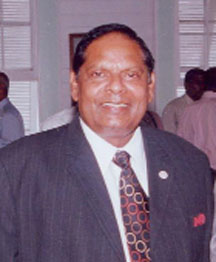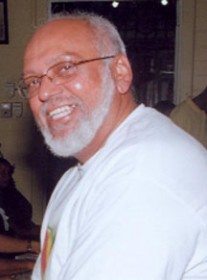Moses Nagamootoo, one of the contenders for the PPP’s nomination as presidential candidate, has again warned that he would withdraw from any process that is unfair or violates internal party democracy and he questioned what he called the `state sponsorship’ of the party’s General Secretary, Donald Ramotar who is also a contender for the position.
Nagamootoo, a parliamentarian and PPP Central Committee Member was speaking on the programme `Eye on the Issues’ hosted by Dr. Yesu Persaud which was aired yesterday.

Nagamootoo, according to a press release issued by his office, told the programme that he is opposed to a single candidate being recommended by the party leadership. He said this process is outdated and a broader consultation with the party’s membership is now required. Nagamootoo, perennially one of the favourites at PPP congresses, had made some of these points in a Stabroek News interview which was published on March 7, 2010.
Nagamootoo, who has spent almost 50 years with the PPP, is of the view that in the interest of party unity, a composite slate of eligible candidates should be put forward and exposed to the rank and file.
Besides Nagamootoo, three other party leaders have declared their intention to seek the nomination. They are House Speaker Ralph Ramkarran, Ramotar and Home Affairs Minister Clement Rohee.
According to the press release, Nagamootoo objected to what he described as “State sponsorship” of a single candidate. He described the exposure of the party’s General Secretary at Cabinet Outreaches and on overseas visits by the President as disadvantageous to other candidates. “This is deliberately selective and unfair” and could derail the selection process, he added.
“If this continues, I will withdraw from the process,” he declared.
When asked about Ramotar’s recent presence at Cabinet outreaches and engagements by the President and government officials, Cabinet Secretary Dr Roger Luncheon said it is indicative of the role the ruling party plays in the administration of the country.
“Donald Ramotar’s presence is reflective of the PPP/C’s role in the administration of this country.” He said that Ramotar, as the General Secretary of the party, continues to contribute “ideologically, programmatically and operationally.” He said that based on this, “a place at the head table” is assured for him as well as “a role to play in the engagement of the government and the Guyanese people.”
When asked who funded the General Secretary’s trips, Luncheon said that public funds were not used for this purpose. “Well… I’m not certain that there is a financial cost that is incurred by Donald Ramotar’s presence at outreaches. Fortunately, we don’t have this resolve to use public funds willy-nilly,” he said. Luncheon added, “these outreaches and our connections with those communities draw heavily on support at the community levels hosting the events and the arrangements for participation.”
Ramotar, who has publicly indicated an interest in becoming the PPP’s Presidential Candidate

for next year’s election, has accompanied President Bharrat Jagdeo on several of his overseas trips and even participated in recent Cabinet outreaches by the government despite not being a member of Cabinet.
On the scheduled visit of Surinamese President Desi Bouterse to Guyana, Nagamootoo told the TV programme that he first met the Surinamese Leader in 1980, after the military coup of that year in the former Dutch colony, and a close bond has since existed between them.
He said that Bouterse had pledged shortly after the coup, during a visit to Suriname by a PPP delegation led by the late Mrs Janet Jagan, to make the Corentyne River a ‘Bridge of Unity’ between the neighbouring countries.
“I am heartened from media reports that so soon after his election, President Bouterse has opted in favour of a bridge being built across the Corentyne River”, Nagamootoo said.
He added that Bouterse has been validated by a democratic process, which Guyanese should respect.
Nagamootoo posited that the recent Surinamese elections hold important lessons for Guyanese as it showed that people are prepared to set aside their past and vote for change and that coalition politics seems to be the wave of the future.




